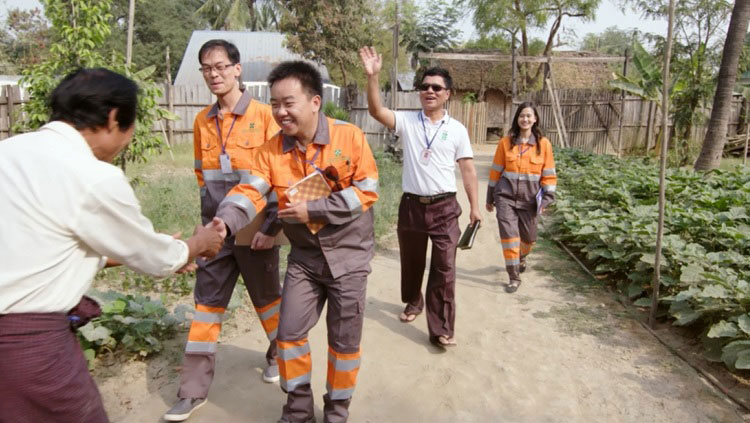Mining Company Wanbao has decided to reach out in a new video released on 25 April explaining the companies view on corporate social responsibility (CSR).
According to a press release from China-I, a risk management advisory company, ‘A New Dawn’ is an unprecedented film that comes at a historic time in Myanmar’s history. A shorter version of the film was released on YouTube on 31 March and had over a quarter of a million hits.
Myanmar Wanbao was forced to stop construction in 2012 on the Letpadaung copper mine due to local opposition to the project. This was hugely reported on. Myanmar Wanbao and the people of Letpadaung found themselves in the eye of a geopolitical storm.
On 29th November 2012, the situation came to a head. The mine site had been barricaded for days by demonstrators and activists. Myanmar police tried to break the stranglehold and the violence that ensued caused an international outcry. The mine’s future couldn’t be more uncertain. It appeared doomed.
None other than Daw Aung San Suu Kyi was tasked with chairing an investigation commission that recommended that the mine should continue, given that it adheres to certain recommendations. Yet, the company had to learn the hard way, that a legal license from the government does not mean a “social license”, the approval of the people.
A spokesperson from Wanbao recently told Mizzima, ‘We had a very difficult time for our Letpadaung copper project in November 2012, particularly after local police cleared protestors at our mine site, when all the construction work was suspended. We felt the importance of getting the “social licence” to operate the project and also building good relationship with our communities, so in 2013, we even approached foreign professional experts China-I to help us mitigate against the social risk we were facing in the community. It has turned out an effective approach to reach out to the communities with the help of China-i. Our Chinese employees from various departments like engineering, mining, operation, HR, CSR etc, after [being] trained by China-i in communication skills, went to the communities and talked with impacted villagers, and listened intently to their concerns. China-I, as our risk advisors, work with us together on the communication strategy and tried to find solutions to the livelihood of the impacted people after land loss. You will find from the film that we conducted numerous rounds of consultations, particularly, in 2014, we did door-to-door visits to the land lost villagers for the “Contribution Plan”, which, later became a turnaround in our relationship with our communities.’
When contacted by Mizzima, a spokesperson from China-I said that “Myanmar Wanbao at that time had not been able to communicate satisfactorily with its local community and was aware that this situation was neither healthy nor sustainable. The company was suffering operational delays at the time and the situation needed a solution grounded in its community. The company was keen to establish better links with its surrounding villages and the wider people of Myanmar. We therefore advised Wanbao that what it needed was a holistic strategy. We worked together to flesh out a strategy to mitigate these risks by engaging constructively with the community. But critically our work was to help establish mechanisms whereby communities can also benefit from the existence of extractive resource companies or companies of any nature.”
‘A New Dawn’ charts how the company learnt to listen to its community, and how both the community and Wanbao have come together to chart a new dawn for themselves and for Myanmar. In the process they came up with a “Contribution Plan” which provides regular and predictable payments to the villagers for the lifetime of the mine. This is the first of its kind in Myanmar and possibly the first of its kind in the world. The company is also investing in electricity, clean water, massive job creation, skill training.
The Wanbao spokesperson continued, ‘. . . there has been a turnaround in our situation with the community. This has taken place due to hard work on both sides and down to numerous rounds of engagement and consultations with the community. They have gotten to know us, and together we have started building and forging good relationships. As you will see from this film, 83% of the land-lost people from 35 project affected villages have accepted the Contribution Plan we offered, which means large majority of impacted villagers have supported our project. Winning our social license has not been easy, but we have learnt a great deal along the way, which we would like to share with others. Moreover, we are working very hard to show the community the tangible benefits of this mine. As you will see in the longer film over 90% of our employees are Myanmar nationals, and that 2526 workers are drawn from the local community. We are also creating a group of small and medium enterprise suppliers for our mine. This in turn to date has created over 300 jobs.
All this will help this area, and the region where our mine is, to be a centre of skill development and learning. We have also set up great health facilities, such as a mobile clinic which visits villages weekly, we have built a local hospital, and we have invested heavily in critical things such as electricity and road buildings. All of this will aid the development of this community further. We want to show people through our actions that this company will always strive to be a force for good.’
The film is described as, ‘. . . a story of hope and the humbling power of dialogue based on mutual respect. With unparalleled access to both the community and to the Chinese company management, the film offers a glimpse of what happens when two conflicting groups come together.’
This article was taken from here.

